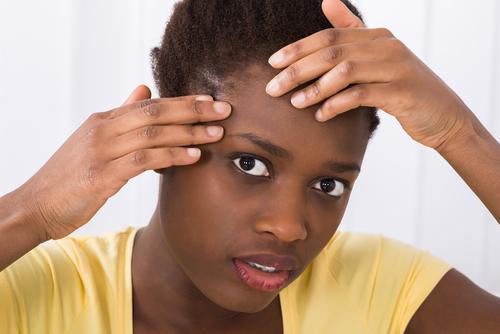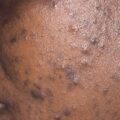Acne is a skin condition that occurs when your hair follicles become plugged with oil and dead skin cells. It causes whiteheads, blackheads or pimples. Acne is most common among teenagers, though it affects people of all ages. The pimples and bumps heal slowly, and when one begins to go away, others seem to crop up.
Although it’s typically associated with hormone fluctuations during puberty, hormonal acne can affect adults of any age. It’s especially common in women. A number of factors may contribute to this, including menstruation and menopause.
It’s estimated that 50 percent of women ages 20 to 29 have acne. It affects about 25 percent of women ages 40 to 49. Expert opinions are mixed when it comes to hormonal acne. Although the Mayo Clinic says hormones generally aren’t a factor in adult acne, hormonal imbalances may contribute to acne in adults with underlying medical conditions.
In other cases, adults with acne may not have any “measurable” hormone issues. This can make diagnosis and treatment challenging.
During puberty, hormonal acne often appears in the T-zone. This includes your forehead, nose, and chin.Hormonal adult acne typically forms on the lower part of your face. This includes the bottom of your cheeks and around your jawline. For some people, hormonal acne takes the form of blackheads, whiteheads, and small pimples that come to a head, or cysts. Cysts form deep under the skin and don’t come to a head on the surface. These bumps are often tender to the touch.
According to Kids Health there’s no sure way to prevent acne. But these tips might help reduce the number and severity of your breakouts:
- Washing your skin is essential (it helps remove excess surface oils and dead skin cells that can clog your pores), but washing too much can actually cause damage by overdrying your skin or irritating existing acne.
- Remember to wash after exercising because sweat can clog your pores and make your acne worse. If you work around greasy food or oil, or if you’ve been sweating from heat or because you’ve been working hard, wash your face and other acne-prone areas as soon as possible.
- If you use skin products, such as lotions or makeup, look for ones that are noncomedogenicor nonacnegenic, which means that they don’t clog pores.
- If you can’t live without your hair spray or styling gel, be sure to keep them away from your face as much as possible. Many hair products contain oils that can make acne worse. Try to use water-based products.
- If you get acne on areas such as your chest or back, avoid wearing tight clothes, which can rub and cause irritation.
Diet: It is unclear what role diet plays in worsening acne. Scientists have found that people who consume a diet that offers a good supply of vitamins A and E and of zinc may have a lower risk of severe acne. One review describes the link between acne and diet as “controversial,” but suggests thata diet with a low glycemic load may help.
Tea-tree oil: Results of a study of 60 patients published in the Indian Journal of Dermatology, Venereology, and Leprology suggested that 5-percent tea-tree oil may help treat mild to moderate acne. If you want to buy tea-tree oil, then there is an excellent selection online with thousands of customer reviews.
Tea: There is some evidence that polyphenols from tea, including green tea, applied in a topical preparation, may be beneficial in reducing sebum production and treating acne. However, the compounds in this case were extracted from tea, rather than using tea directly.
Moisturizers: These can soothe the skin, especially in people who are using acne treatment such as isotretinoin, say researchers. Moisturizers containing aloe vera at a concentration of at least 10 percent or witch hazel can have a soothing and possibly anti-inflammatory effect.
For some people, over-the-counter (OTC) products work to help clear up acne. It may take some time to find one that works best for you — some may not do the trick and others may cause irritation. OTC acne products come in different strengths. The most popular and effective OTC acne-fighting ingredient is benzoyl peroxide. Another ingredient, salicylic acid, can help to dry up pimples.
If you find OTC products aren’t working for you, it’s best to seek a doctor’s advice. A doctor can prescribe special gels or creams, pills, or a combination of both. It may feel a bit awkward or embarrassing to talk about your acne with someone, but your doctor is trained to help get your skin looking its best.
What about pimples you already have? It’s tempting, but popping or squeezing a pimple usually won’t get rid of the problem. Squeezing can actually push infected material and pus deeper into the skin, which can lead to more swelling and redness (not what you want before a big date!), and even scarring, which can be permanent.
If you’re taking a prescription acne medication, finish your entire prescription even if your skin clears up, unless your dermatologist says you can stop. If you stop too early, there’s a chance your skin could break out all over again.
Eating nutritious foods can help keep you healthy, of course, and your skin will benefit from getting enough vitamins and minerals. But the bottom line is that you don’t need to be obsessive about what you eat or how often you wash your face to control acne. If you don’t find an OTC product that works for you, talk to your doctor or a dermatologist for some advice on living through the acne years. ALSO READ: Does Colostrum Cause Acne?





